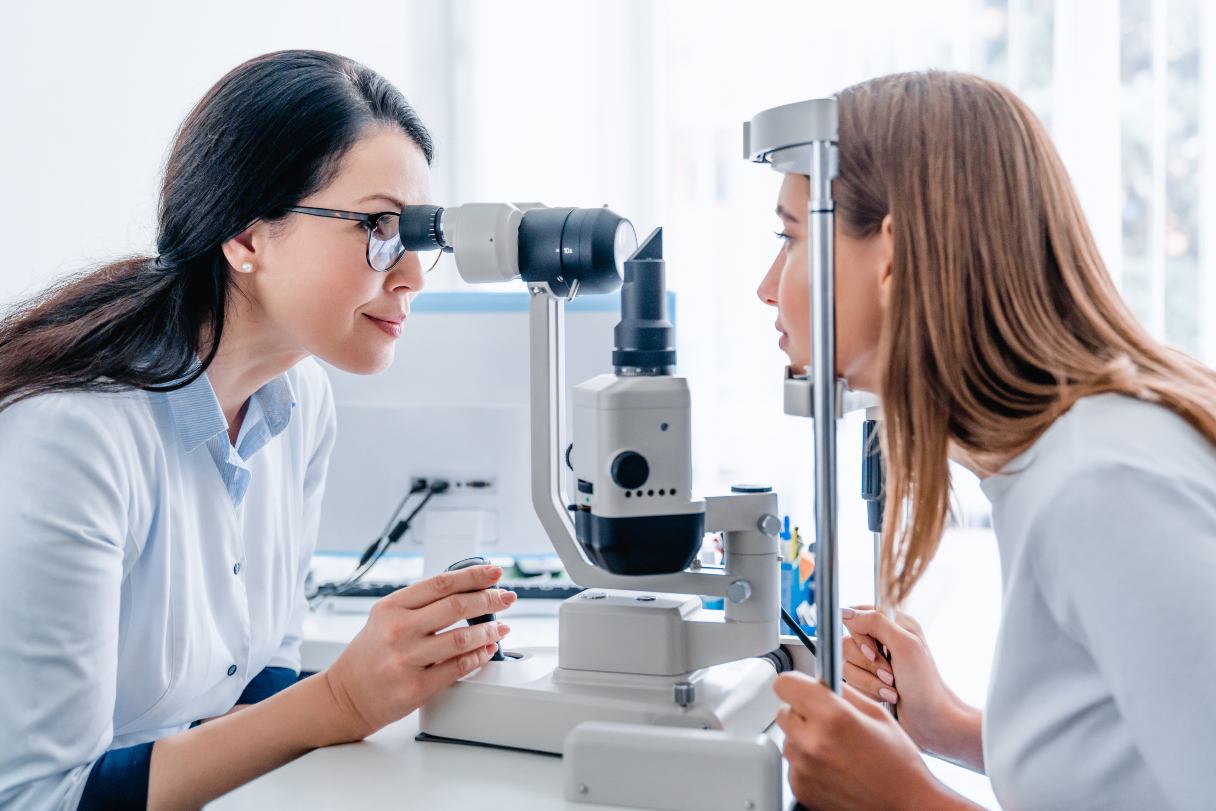Can you imagine waking up in the morning and opening your eyes to a world in perfect focus — without the need for contact lenses or eyeglasses? It can be a reality with orthokeratology, which reshapes your eye while you sleep, and without surgery. Learn more about how it works, pricing and financing options below.
What Is Ortho-K?
Orthokeratology (ortho-k) is a non-surgical, non-invasive treatment that uses specialized, rigid gas permeable (RGP) contact lenses to gently reshape the cornea's curvature and improve vision.1
Ortho-k is sometimes referred to as orthodontics for your eyes or the optical equivalent of a retainer or bite plate you wear overnight in your mouth.2 Ortho-k eliminates the need to wear glasses or contact lenses, allowing you to see with temporarily corrected vision.3
Benefits
Orthokeratology can treat mild to moderate myopia or nearsightedness.3 It can sometimes treat lesser degrees of astigmatism, farsightedness and presbyopia as well.4 Your eye doctor can advise on whether orthokeratology lenses can manage your specific type and degree of refractive error based on an eye exam.4
Ortho-k is sometimes recommended for correcting myopia in children or young adults who want to be free of glasses or traditional contacts but are too young to receive LASIK or other corrective refractive surgery because their eyesight is still developing.3
Patients who want a non-surgical option, or who are not good candidates for corrective surgery due to other issues (such as dry eye), may also benefit from ortho-k. Likewise, those whose daytime activities make it challenging to wear contact lenses or eyeglasses — people who play contact sports or work in dusty environments, for example — may also benefit from ortho-k lenses.5
Types
Currently, three brands of orthokeratology contact lenses have been approved by the FDA: Euclid lenses, most often prescribed for those diagnosed with myopia; Paragon Corneal Refractive Therapy (CRT®) lenses, produced by CooperVision® Specialty EyeCare; and Vision Shaping Treatment (VST®), manufactured by Bausch + Lomb.5
While all three brands of ortho-k lenses are designed to reshape the cornea to temporarily correct vision, your provider can recommend which brand might work best for you based on your specific vision needs.
How Much Does Ortho-K Cost?
The national average cost* of ortho-k lenses ranges from $1,120 to $4,158.6 Orthokeratology costs vary widely depending on the type and degree of your refractive error.3
The cost will also vary based on the optometrist or ophthalmologist, which region of the country you are in and the type of practice where you have your exam and fittings.
Fitting ortho-k lenses requires a greater degree of expertise than fitting regular contact lenses and can be a more intricate, time-consuming process involving multiple sets of lenses.5
Average cost of ortho-k by lens type
Below is a breakdown of the average cost* and cost ranges of the different types of ortho-K lenses.6
| Type of ortho-k lens | Average cost | Cost range |
|---|---|---|
| Euclid Emerald | $1,456 | $1,120 to $2,758 |
| Corneal refractive therapy (CRT) | $1,554 | $1,215 to $2,985 |
| Vision shaping treatment (VST) | $2,286 | $1,782 to $4,158 |
Average cost of ortho-k lenses by state/district
Below is a breakdown of the average cost* of the different types of ortho-k lenses by all 50 states and the District of Columbia.6
| State/District | Euclid Emerald | Corneal Refractive Therapy (CRT) | Vision Shaping Treatment (VST) |
|---|---|---|---|
| Alabama | $1,243 | $1,343 | $1,982 |
| Alaska | $1,762 | $1,878 | $2,770 |
| Arizona | $1,467 | $1,573 | $2,332 |
| Arkansas | $1,266 | $1,375 | $1,975 |
| California | $1,823 | $2,004 | $2,797 |
| Colorado | $1,458 | $1,557 | $2,327 |
| Connecticut | $1,520 | $1,622 | $2,298 |
| Delaware | $1,453 | $1,558 | $2,273 |
| District of Columbia | $1,812 | $2,027 | $2,740 |
| Florida | $1,454 | $1,547 | $2,281 |
| Georgia | $1,314 | $1,447 | $2,075 |
| Hawaii | $2,322 | $2,298 | $3,606 |
| Idaho | $1,482 | $1,577 | $2,322 |
| Illinois | $1,430 | $1,502 | $2,391 |
| Indiana | $1,311 | $1,365 | $2,044 |
| Iowa | $1,282 | $1,342 | $1,973 |
| Kansas | $1,266 | $1,373 | $2,039 |
| Kentucky | $1,328 | $1,438 | $2,070 |
| Louisiana | $1,341 | $1,445 | $2,144 |
| Maine | $1,526 | $1,543 | $2,330 |
| Maryland | $1,588 | $1,772 | $2,589 |
| Massachusetts | $1,708 | $1,787 | $2,711 |
| Michigan | $1,322 | $1,435 | $2,119 |
| Minnesota | $1,360 | $1,463 | $2,132 |
| Mississippi | $1,254 | $1,302 | $1,987 |
| Missouri | $1,266 | $1,380 | $2,039 |
| Montana | $1,423 | $1,528 | $2,246 |
| Nebraska | $1,310 | $1,395 | $2,046 |
| Nevada | $1,431 | $1,568 | $2,293 |
| New Hampshire | $1,528 | $1,623 | $2,381 |
| New Jersey | $1,588 | $1,703 | $2,554 |
| New Mexico | $1,310 | $1,410 | $2,061 |
| New York | $1,570 | $1,638 | $2,396 |
| North Carolina | $1,325 | $1,442 | $2,127 |
| North Dakota | $1,330 | $1,425 | $2,090 |
| Ohio | $1,330 | $1,438 | $2,134 |
| Oklahoma | $1,262 | $1,330 | $1,992 |
| Oregon | $1,590 | $1,645 | $2,488 |
| Pennsylvania | $1,425 | $1,510 | $2,227 |
| Rhode Island | $1,529 | $1,595 | $2,388 |
| South Carolina | $1,381 | $1,417 | $2,168 |
| South Dakota | $1,293 | $1,368 | $2,058 |
| Tennessee | $1,316 | $1,403 | $2,085 |
| Texas | $1,340 | $1,453 | $2,114 |
| Utah | $1,473 | $1,568 | $2,249 |
| Vermont | $1,554 | $1,612 | $2,410 |
| Virginia | $1,412 | $1,528 | $2,215 |
| Washington | $1,632 | $1,710 | $2,594 |
| West Virginia | $1,302 | $1,390 | $2,048 |
| Wisconsin | $1,360 | $1,457 | $2,139 |
| Wyoming | $1,372 | $1,458 | $2,083 |
Does vision insurance cover ortho-k?
Orthokeratology is typically considered an elective procedure by most vision insurance plans and therefore not completely covered by many plans. Some plans may cover a portion of the fees.3
How Does Ortho-K Work?
An ophthalmologist or optometrist will use an instrument called a corneal topographer to map the shape and curves of your cornea and design rigid, gas-permeable orthokeratology lenses specifically fitted for your eyes. The procedure is quick and pain-free.3
Ortho-k lenses are worn overnight to flatten and reshape the cornea, then removed during the day. Orthokeratology lenses are more rigid than regular contact lenses, but allow oxygen to circulate so your eyes stay healthy while you sleep.3
When ortho-k lenses are removed in the morning, the reshaped corneas remain flattened.3 You should experience acceptably clear vision for as long as a day or two.5
For best results, you'll need to continue wearing the ortho-k lenses every night.1 They work much like a retainer for your teeth, helping ensure that the cornea retains its new shape.2
If you choose to discontinue wearing the lenses, you may still see fine for a couple of days, but your myopia will gradually return since the corneal reshaping is temporary, and you’ll need to return to wearing glasses or traditional contact lenses during your waking hours.7
Ortho-K Results: What to Expect
Most people require a series of three progressively flatter lenses to achieve the best results — usually 20/40 to 20/20 vision.3
You may experience a dramatic improvement in your vision after just a night or two. If your nearsightedness is more severe, it may take a couple of weeks or longer to achieve those results. During the process, you may temporarily experience blurred vision, glare and halos around lights.5
Because orthokeratology lenses are heavier than regular lenses, you may be aware of them as you fall asleep. The lenses may become more comfortable over time.3
Once your corneas have reached the correct prescription, your eye doctor may modify your retainer lenses to maintain your vision. Your lenses should be worn as often as your provider recommends.7
Is Ortho-K Safe?
In general, ortho-k is a non-invasive, pain-free procedure. However, there is a chance of corneal abrasion or corneal infections. Children and teens who may be less likely to maintain proper hand and contact lens hygiene may be at greater likelihood for developing an eye infection due to ortho-k use.3
To determine if ortho-k lenses are a good choice for you, schedule an appointment with your eye doctor for a comprehensive eye exam. Your doctor can answer your eye care questions and recommend the best treatment for your vision problem, which may be ortho-k non-surgical vision correction. If your eyes remain healthy, there is no limit to how long ortho-k could be an effective treatment for you.
Frequently Asked Questions About Ortho-K
Here are answers to some commonly asked questions about ortho-k. For more information about orthokeratology, ask your eye care professional.
Financing Ortho-K With the CareCredit Credit Card
Whether you’re purchasing stylish new frames, getting contacts or due for an eye exam, the CareCredit credit card can help you pay for care where your insurance leaves off.** Use our Acceptance Locator to find a vision specialist near you that accepts CareCredit so you can see all that life has to offer. Continue your wellness journey by downloading the CareCredit Mobile App to manage your account, find a provider on the go and easily access the Well U blog for more great articles, podcasts and videos.
In addition to vision care, you can also use your CareCredit credit card for dentistry, cosmetic, pet care, hearing, health systems, dermatology, pharmacy purchases, spa treatments and so much more within the CareCredit network. How will you invest in your health and wellness next?
Author Bio
Anne-Marie Kennedy is a freelance writer with more than 20 years of experience covering health and wellness, personal finance and real estate/investing.








